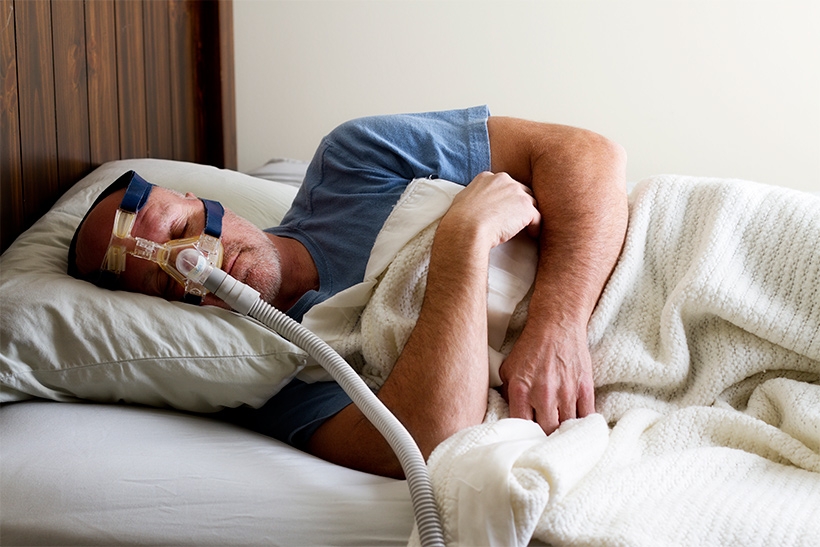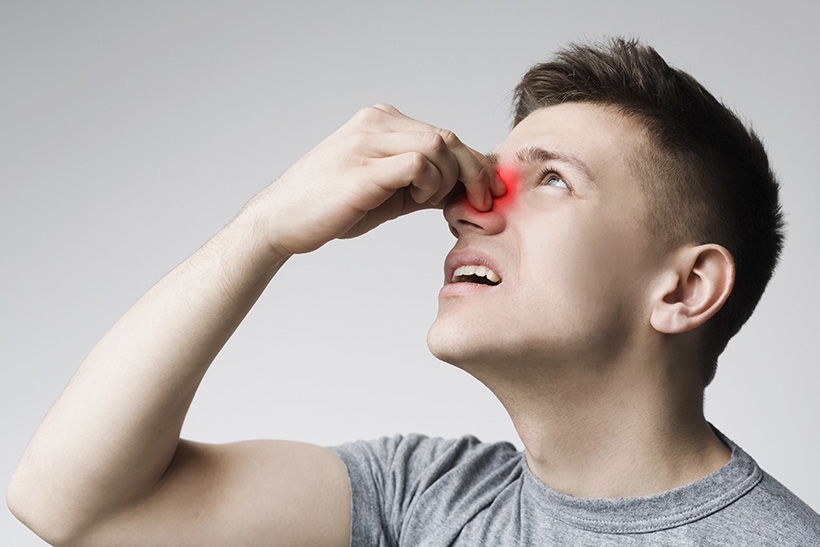We’ve all experienced a poor night’s sleep due to a stuffy nose. When it’s hard to breathe, it’s also hard to sleep as we become uncomfortable and possibly start to snore. The result is a long, unpleasant night for you and your sleeping partner, leaving you both feeling tired in the morning.
This situation can be even worse when the condition is an ongoing one due to a chronic sinus problem.
In this blog, board-certified Houston otolaryngologist (ear, nose, and throat specialist) Dr. Cecil Yeung will explain the relationship between sinusitis and sleep apnea.
What is sinusitis?
Sinusitis is defined as inflammation of the sinus cavities. These air-filled spaces are found between the eyes and behind the forehead, nose, and cheeks. When everything performs as they should, a thin layer of mucus and tiny hairs called cilia that line the sinuses are able to filter bacteria and other pollutants. These are eventually drained harmlessly though small openings into the nasal cavity.
Healthy sinuses are able to clear their mucus every 10 minutes. But when too much mucus is produced and isn’t able to drain normally, it can build up and lead to inflammation and infection.
A sinus infection – which is often referred to as sinusitis – is accompanied by a number of painful symptoms that can include the following:
- Sinus pressure
- Headaches
- Facial pain
- Fatigue
In addition to these frustrating symptoms, sinusitis can also affect the amount and quality of sleep that you’re able to get.
What is sleep apnea?
Sleep apnea is a serious disorder that’s characterized by repeated pauses in your breathing while you sleep. Each pause can last from about 10 seconds to minutes at a time. These pauses can occur 30 or more times an hour, leading to sleep that’s seriously disrupted. It also disrupts how your body takes in oxygen, interfering with blood flow into your arteries and brain.
This disorder occurs when something completely or partially blocks your upper airway. As a result, you may gasp for air and snore at night. In fact, chronic snoring is the symptom that most often prompts a person to seek medical attention for sleep apnea.
Why should I seek an evaluation for my sinusitis and sleep apnea?
When the sinus cavities have difficulty draining, it can lead to sinusitis that’s chronic (lasting for at least eight weeks) or recurrent (several cases that recur with a year). This could be an indication of an underlying anatomical issue. This same issue could be what’s causing your airway to become partially or completely blocked during sleep, leading to sleep apnea.
In cases where sinusitis is caused by allergies or a common cold, medication and nasal sprays can often effectively treat the problem.
However, if an anatomical problem is the cause of your symptoms, conservative treatments such as medication will rarely provide much relief. Some of the most common anatomical issues include nasal polyps, blocked or narrow sinus openings, or a deviated septum.
If an anatomical issue is at the root of your symptoms, a minimally invasive procedure can often correct the underlying issue and thus resolve your symptoms. This can provide substantial relief and reduce your chances of developing long-term chronic health issues that have been associated with sleep apnea, such as heart disease and high blood pressure.
What is the relationship between sinusitis and sleep apnea?
Poor sleep and a feeling of being fatigued during the day are frequent complaints of patients who have sinusitis.
Sinus and nasal problems often contribute to snoring and sleep apnea, but they are often overlooked and left untreated.
Where can I get treatment for my sinusitis and sleep apnea in Houston?
Dr. Yeung can determine the exact cause of your symptoms and explain the available treatments that can address your problem. He’s one of the top Houston ENT (ear, nose, and throat) physicians and sinus specialists and is known for his professionalism for leading the way in functional endoscopic sinus surgery(FESS). In fact, he pioneered the use of this surgery in Houston and has performed over 4,000 highly successful sinus surgeries.
Dr. Yeung offers a successful, minimally invasive approach to treating sinus diseases. If you’re suffering from sinusitis and sleep apnea, schedule a consultation today.




